Honda workers in Swindon to face 'reality check' after it closes
- Published
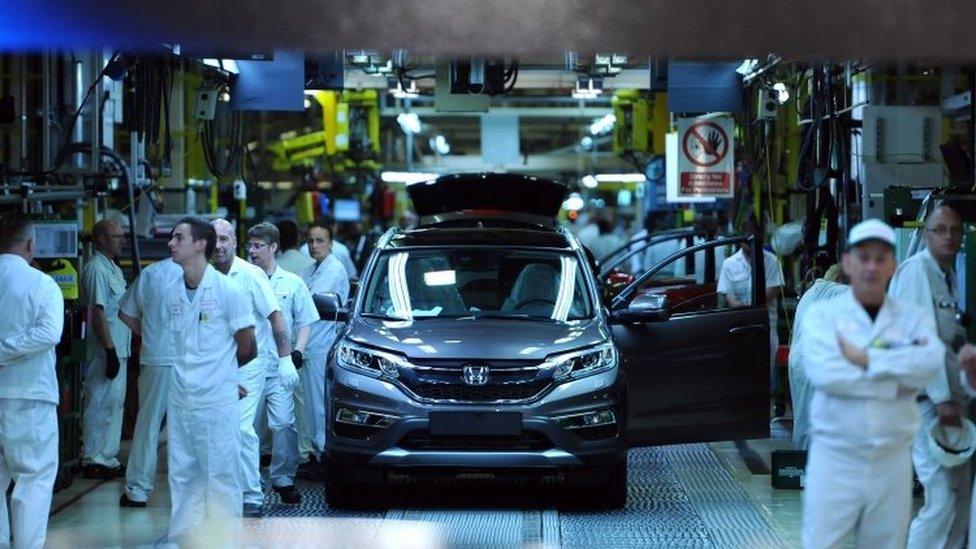
Of 3,000 workers still at the factory, only 200 will stay on to decommission the factory
The loss of Honda in Swindon is not just bad news for the 3,000 people who work there, but will send ripples out through the local economy, with about 1,800 jobs ending at two local firms that supply the plant. As 35 years of manufacturing history comes to an end, staff have been sharing their feelings about the end of an era.
For workers like Michael Poole the announcement, in February 2019, that Honda was to close the Swindon plant was "a huge shock".
He was a year into an apprenticeship and was in a training session when his team leader came in with the news.
"I felt like I'd got my foot on a ladder of a career I was really interested in, so it knocked us for six really.
"There were tears, from people you don't normally see cry. We were just left swinging in the breeze."
Friday 30 July 2021 was set as the last official day of car production, and the last day of most workers' contracts.
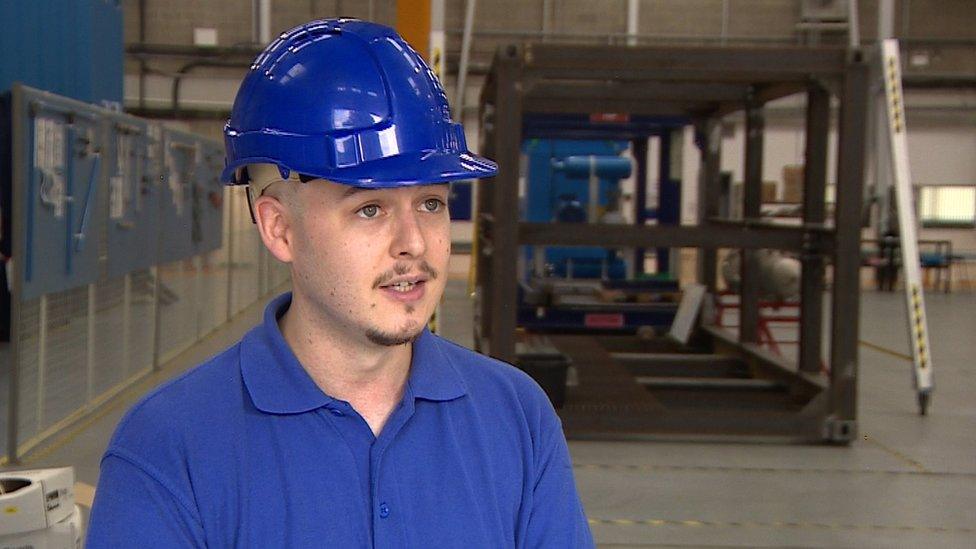
"We were just left swinging in the breeze," said Michael Poole, who was an apprentice at Honda
Why are they leaving?
The Japanese car maker moved to the Wiltshire town in 1985, setting up on the site of an old RAF airfield that once built and tested Spitfire fighter planes.
Since then, workers, or "Honda Associates" as they are called, have made 3.7 million cars.
At its peak, 680 cars were rolling off the line every day with each one tested on the old Spitfire runway.
First the Accord, then the Jazz and CRV were made in the plant, but it was the Honda Civic that became Swindon's flagship product, exported across Europe.
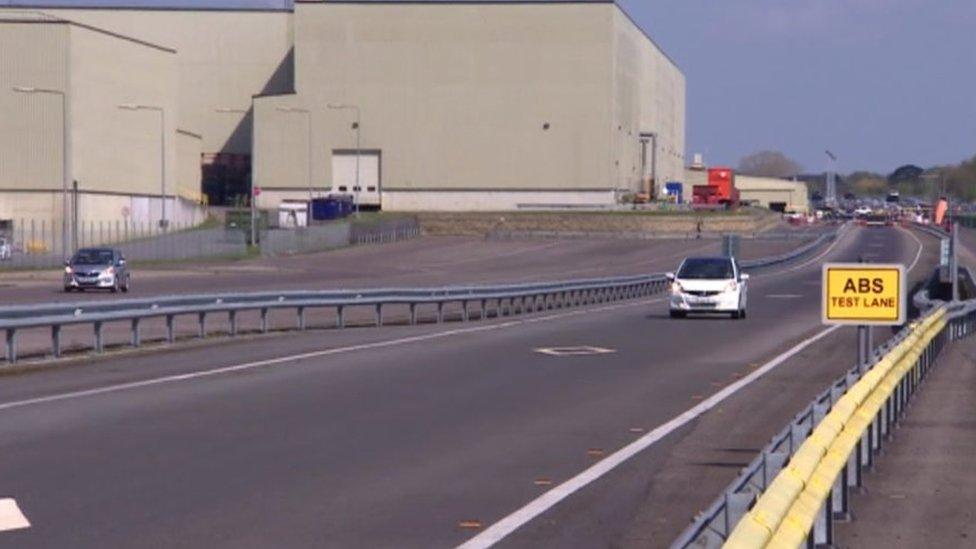
Every car made at Honda's Swindon factory is tested on what used to be a runway for RAF Spitfires
Professor Andrew Graves from the University of Bath has worked in the car industry for decades, from mass-production firms to Formula One.
"Honda came because Britain was in the European market," he said.
"When they arrived, standards were terrible in the British car industry, but they improved fast."
By 2019 Honda Swindon was one of the company's most productive plants.
But sales were falling across Europe and growing in America and Japan, while the company faced the challenge of electric cars - a complete re-invention of the industry.
Even so, analysts and workers were taken completely by surprise when Honda's Chief Executive in Tokyo announced they would close the Swindon plant.
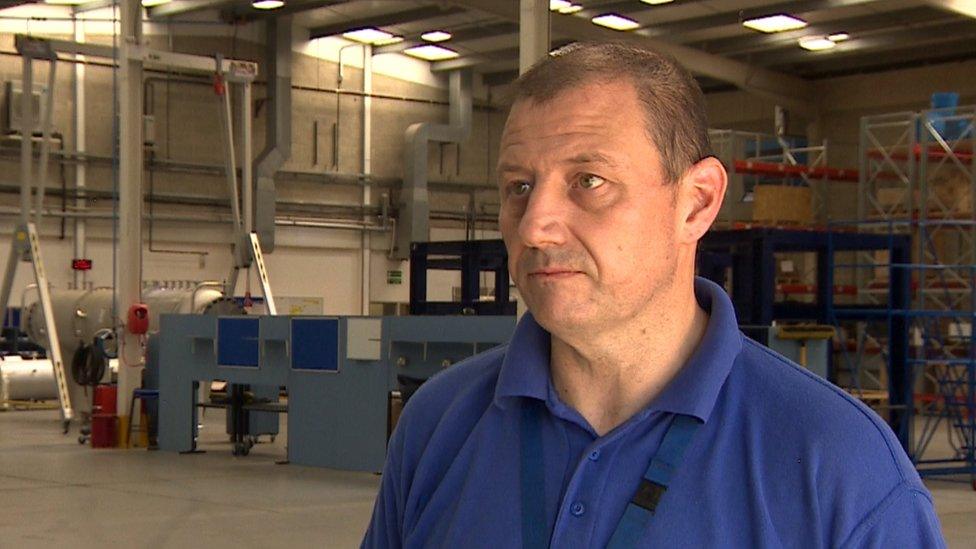
Jim Brennan was an apprentice at Honda UK when the firm announced it would close the plant
Jim Brennan, who had not long started at the plant when its closure was announced, said: "I liked working at Honda, and I was halfway through an apprenticeship, so it was just like my world had collapsed."
In Tokyo, Honda executives denied the decision had anything to with Brexit but it came as the British government was in deadlock over whether to stay in the European Single Market or leave, and risk 10% export tariffs on sales to the EU.
Prof Graves is convinced Brexit played a crucial part.
He said: "The Swindon factory was world-class but because we chose to pull out of Europe, which was the most important market to Honda, they chose to stick with America and Japan.
"Brexit was the straw that broke the camel's back."
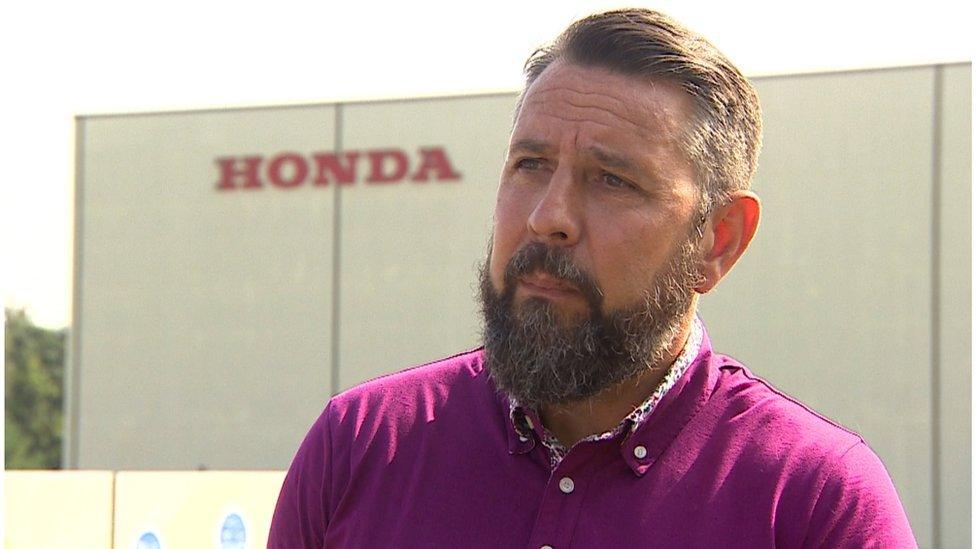
Alan Tomala and his Unite the Union colleagues negotiated an "unprecedented" redundancy deal for Honda workers
Have the workers got a good pay-off?
"It's an unprecedented deal in my view," the union man told me. "I've not experienced anything this good in this industry, or any other."
Alan Tomala worked at the Honda plant for 12 years before becoming a full-time negotiator with Unite the Union.
At first, they tried to change the company's decision - coaches were hired, workers rallied and a demonstration was mounted outside Parliament but executives in Tokyo were unmoved.
Union negotiators switched tack, trying to get the best redundancy deal they could.
Production would continue for two years, and already Brexit changes were making it harder to get parts to the plant.
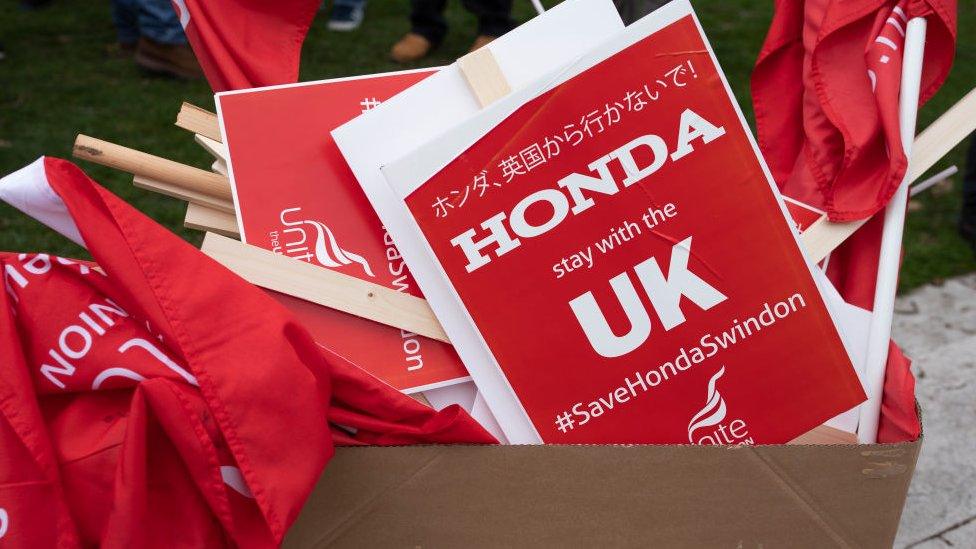
Honda employees protested over the planned closure outside the Houses of Parliament in March 2019
Then Covid made life even harder and managers were keen to avoid any industrial action so the company improved their offer substantially.
Workers will get six and half weeks' pay for every year served, without a cap, alongside other benefits.
Mr Tomala said: "They are going to walk out with very lucrative redundancy packages, especially if you've been here a long time."
Are there enough good jobs to go round?
"At the moment there are more jobs going than people looking for them," said Ashlea Thompson, who runs a recruitment firm in Swindon, specialising in industrial jobs.
But she said many Honda workers will struggle to match the pay they are used to.
Ms Thompson told me about a Honda machine operator who came to see her.
He was on £20 an hour, but she had to tell him he would struggle to beat £10 an hour for similar work in other firms.
She said: "There will be a bit of a reality check for the Honda workers."
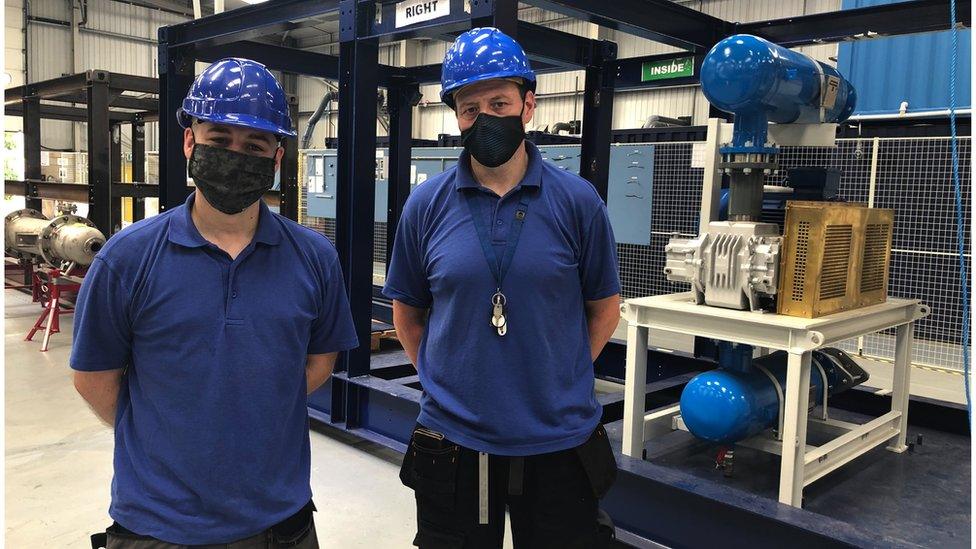
Michael Poole (left) and Jim Brennan have been able to continue their Honda apprenticeships at another Swindon firm, Recycling Technologies
There has been good news for Mr Brennan, Mr Poole and 25 other Honda apprentices. All have been taken on immediately by other manufacturing firms in the town.
I met Mr Brennan at his new job, making machines that recycle soft plastics, the flimsy wrappers and films that normal recycling plants cannot handle.
Recycling Technologies is a brand new company in a shiny new shed, just a few hundred yards from the giant car factory.
"It's fantastic work," he said.
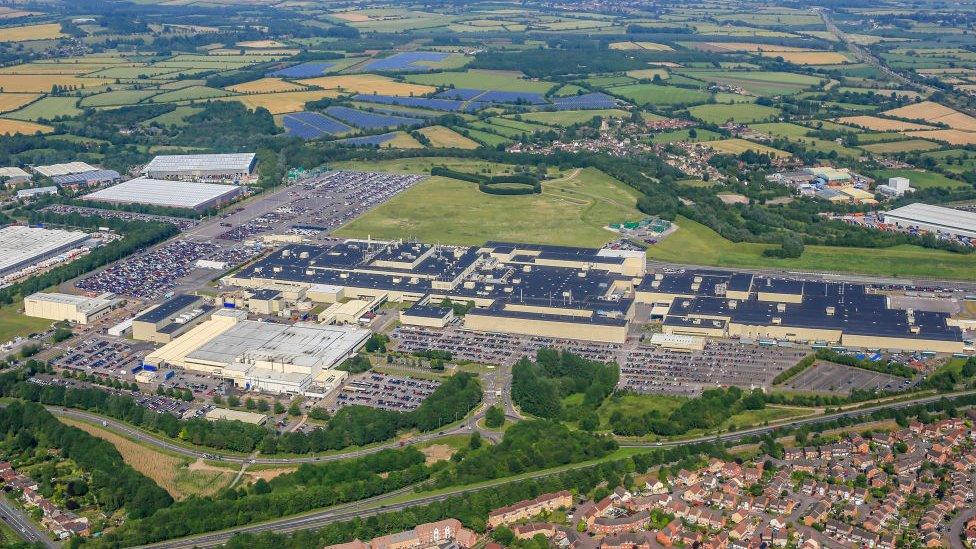
The Honda UK Manufacturing Site covers over 350 acres in East Swindon
"Completely different to Honda, every day is different and I feel like we are making a contribution to our children's futures."
What next for Swindon?
"Swindon has a history of reinventing itself," one of the town's business leaders told me.
Paul Moorby runs a software firm and chairs the Local Enterprise Partnership.
With the local council, it was the partnership's job to help find a buyer for the site, and get jobs for the workers.
In the end it was Honda themselves who found a buyer - not another household name, but an industrial developer called Panattoni.
They specialise in creating logistics parks, full of high-spec warehouses perfect for the new world of online retailing.
The car factory is already surrounded by big distribution sheds.
B&Q, Aldi, Amazon and a host of smaller firms have warehouses full of robots and forklifts, big trucks and small delivery vans bustling round the estates.
Are these jobs really as good as making cars?
Mr Moorby insists the warehousing industry has modernised.
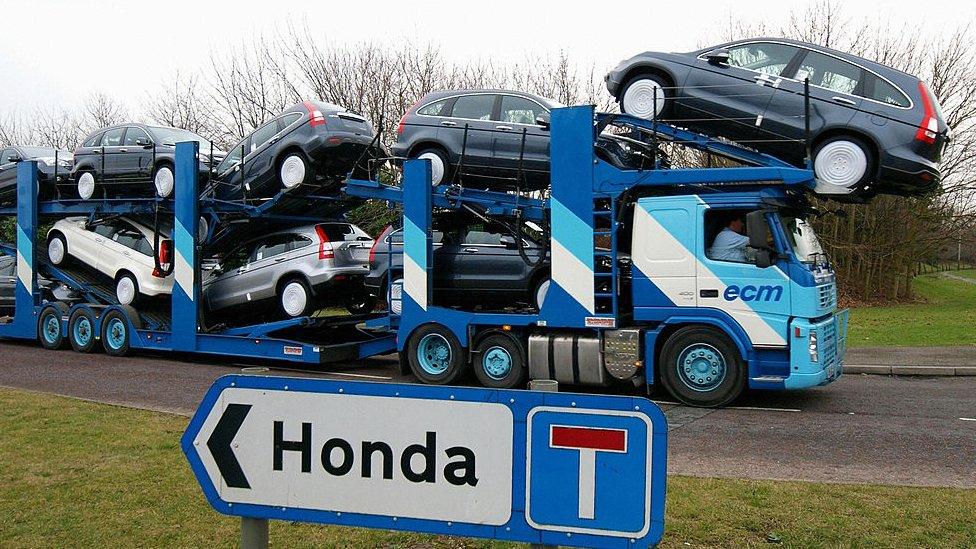
He put it like this: "Logistics is an advanced manufacturing industry, and logistics managers can command some of the best salaries in the country, I would suggest."
It will be a year at least until the old Spitfire airfield is transformed from car factory into logistics park.
Redundancy payments will ease the transition for thousands of staff but for the third time in its history, Swindon is changing again.
"Two hundred years ago two canals came together here and we based our industry on that," said Mr Moorby.
"Then the railways came, they lasted 120 years and the Great Western Railway works employed thousands in the town.
"Who knows what's next, but I know the people of Swindon will be ready for that challenge."
Related topics
- Published19 February 2019
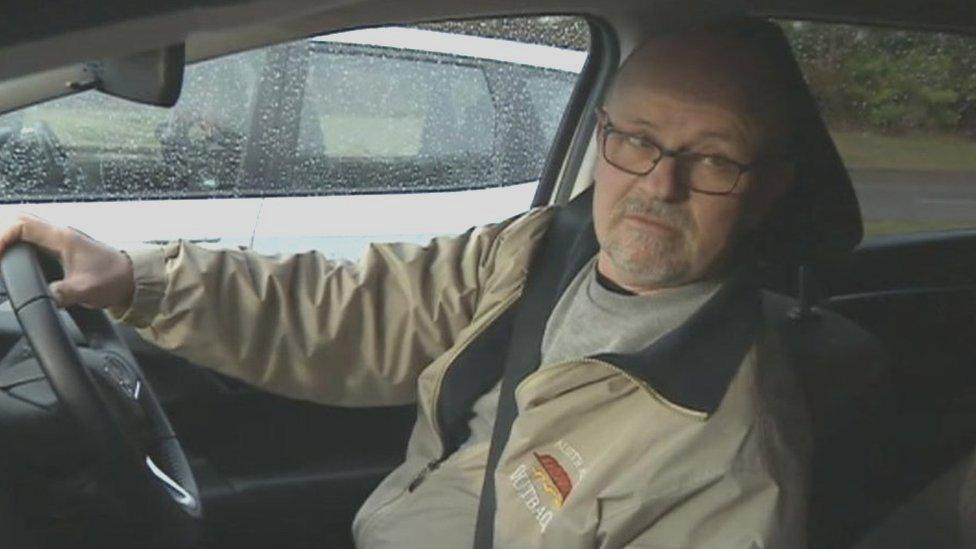
- Published13 May 2019
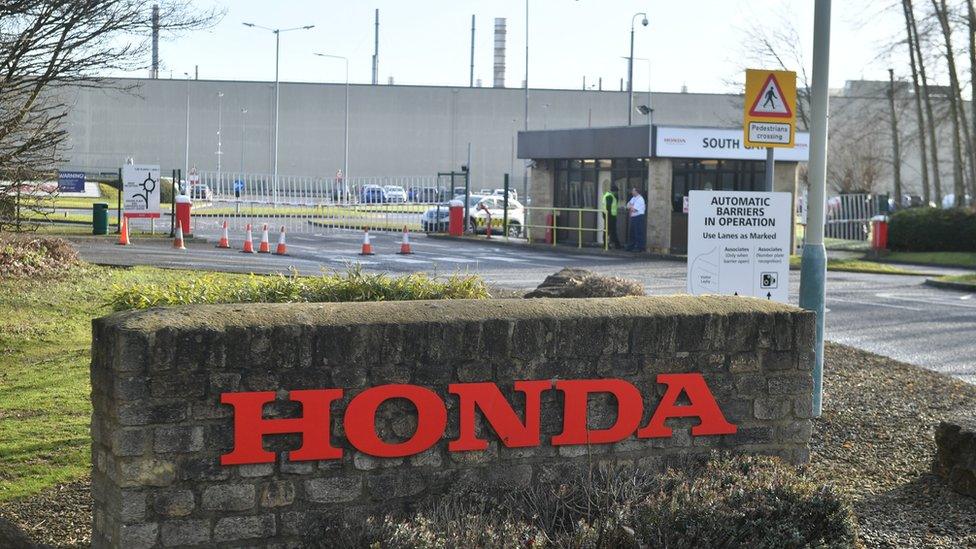
- Published26 March 2021
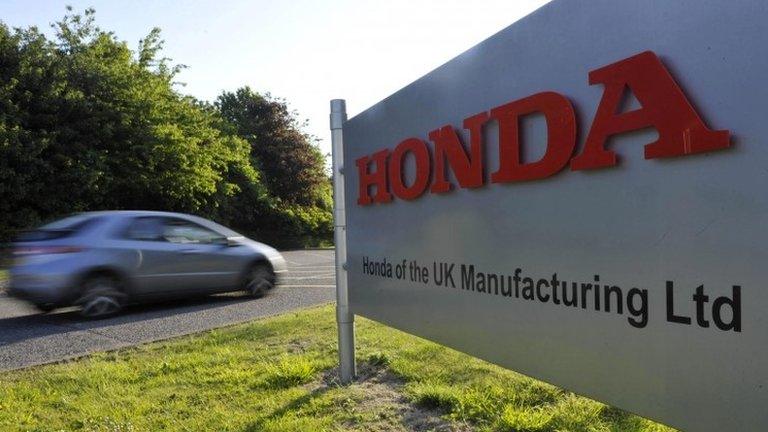
- Published19 February 2019
